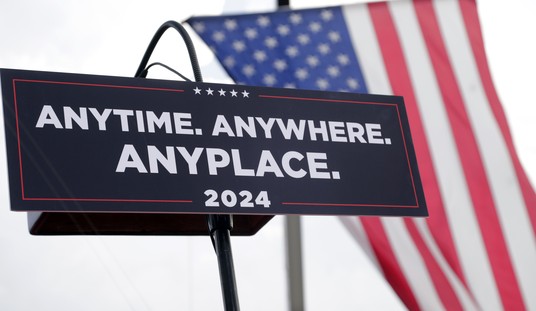In November, a referendum to add the current statutory definition of marriage to the Minnesota state constitution narrowly lost, 47/53, in a presidential election featuring a large turnout for Barack Obama. The Democrats took control of the state legislature, and as expected, have worked to change the statutory definition — just as the marriage-amendment backers predicted if the referendum failed. The state House has scheduled a vote for Thursday, and the state Senate is preparing their own vote:
The Minnesota House has scheduled a Thursday debate and floor vote on the bill to legalize same-sex marriage in the state.
House Speaker Paul Thissen has said that the bill would not be brought to a vote unless they had secured the 68 votes that would be needed to pass the legislation. A number of DFL lawmakers representing districts that supported last fall’s proposed constitutional amendment to ban gay marriage have voiced their support of the marriage equality bill in recent weeks.
Also on Tuesday, a Minnesota Senate committee is giving a last look at the bill to legalize gay marriage before full House and Senate votes.
The Senate Finance Committee is planning to review the gay marriage bill’s fiscal impact on Tuesday morning. A fiscal analysis finds it would add small costs to state employee health insurance costs but also generate revenue from an expected spike in marriage licenses.
Er, what? A marriage license costs $115, and is a one-time fee. If applicants supply proof of pre-marital counseling, that fee drops to $40. The “small costs” of adding hundreds of people to public-sector health insurance plans will cost a lot more than $115, and it will cost that every single year. Regardless of whether one supports redefining marriage in this state, this fiscal analysis is absurd.
Besides, the cost isn’t the issue for either side. Politicians and voters have strong opinions on this, but it’s not because it’s going to cost the state oodles of money, which it won’t. It’s because both sides believe that this is an issue of liberty and cultural values, and the question will be which of the latter prevails, and what liberty remains for the other side.
In that vein, be sure to watch the video presentation from the Star Tribune by the opponents of this bill (which is not embeddable). The legislation contains language that supposedly protects religious institutions from being forced to facilitate same-sex weddings, but that doesn’t cover private-sector businesses who may not want to participate in them because of their own religious beliefs. My friend Theresa Collett explains this near the end of the video, as she has from the earliest days of the marriage amendment debate.
Don’t count on the religious protection to last, either. As I wrote at the time of the election, the close relationship between the state and religious institutions on weddings will provoke all sorts of lawsuits designed to force those institutions out of the marriage business entirely:
Third — and to my mind, the most compelling, especially of late — allowing for the possibility of redefining marriage leaves churches vulnerable to government intrusions at the altar. Right now, churches act as agents of the state in conducting weddings. For those who think that a change in definition would not inevitably lead to mandates on churches to “not discriminate” in conducting ceremonies for those relationships which violate their religious doctrines hasn’t been paying attention to the HHS mandate. In that case, the federal government will force religious organizations (schools, charities, health-care providers) to violate their doctrines by facilitating access to contraception and sterilization, and that’s without the added lever of acting in stead of the state, as churches do when officiating at weddings. Instead of leaving marriage to the churches, a change in definition will give the state a powerful way to either force churches to perform weddings that violate their belief systems or stop performing them altogether.
In my opinion, the state has zero legitimate interest in consensual sexual relationships between non-consanguinary adults — except for the procreative potential of heterosexual relationships. Otherwise, the proper action of government to all other consensual, non-consanguinary sexual relationships should be respect for private choices, not public validation. The recognition of marriage was never a “love license,” but a forward-looking institution designed to provide legal protection for families, especially oriented to children produced explicitly from those unions. Everything else should be a matter of contract law, which is sufficient to deal with all other issues.
Still, the licensing and recognition of marriages is a government policy, set by the people of the state, and the legislature is the legitimate representative institution for setting government policy (as opposed to the judiciary). Government at all levels passes unworkable and poorly-advised policies; it’s part of the messy process of self-government. If Minnesotans decide the only legitimacy of adult relationships comes from government licensing of them, well, they’ll have to deal with the consequences of that decision … and they won’t be long in coming.
Update: Edited the penultimate paragraph after posting.
Update: Because this argument arose in the comments and in e-mail, I want to address it directly. This argument does not state that only marriages that produce children are legitimate marriages. The only relationships that can of themselves produce children are those which are heterosexual in nature, which means that the marriage form is defined by law as one man and one woman. Within that form, men and women can marry each other whether they intend to have children or not (or are capable of doing so or not), because that is the defined form of marriage that receives government recognition.
The form is established by the state interest in the relationship, but that doesn’t require procreation for legitimacy. Once the form is established, it should be open to all who wish to enter into the specific relationship type for which government provides that recognition.








Join the conversation as a VIP Member